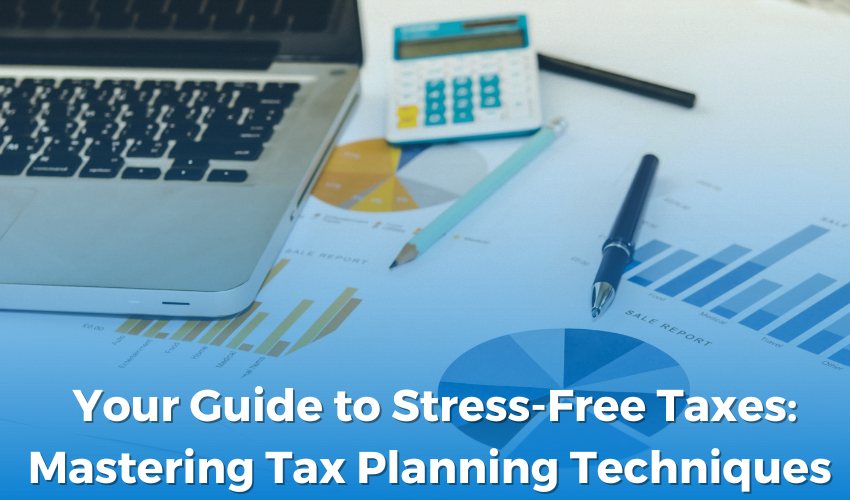

18-12-23
While we can't avoid the latter, we can certainly make the process less daunting and stressful through effective tax planning. In this guide, we will explore essential tax planning techniques to help you navigate the intricate landscape of taxation and ensure a stress-free tax season.
1. Understand Your Tax Liability
The first step to stress-free tax planning is gaining a clear understanding of your tax liability. This involves knowing your income sources, deductions, and credits. Create a comprehensive list of your financial activities throughout the year, including income from various sources such as employment, investments, or side businesses. Understanding your financial landscape is crucial for accurate tax planning.
2. Keep Impeccable Records
Accurate record-keeping is the bedrock of stress-free tax preparation. Maintain organized and up-to-date records of income, expenses, and receipts. Consider leveraging digital tools or apps that simplify the process. These records not only ensure that you claim all eligible deductions but also serve as a valuable resource in case of an audit. The more organized you are throughout the year, the smoother the tax filing process will be.
3. Leverage Tax-Advantaged Accounts
Take advantage of tax-advantaged accounts to optimize your tax liability. Contributing to retirement accounts such as a 401(k) or an individual retirement account (IRA) can reduce your taxable income while helping you secure your financial future. Health Savings Accounts (HSAs) and Flexible Spending Accounts (FSAs) are also excellent tools for managing healthcare expenses with tax benefits.
4. Timing Is Key: Manage Capital Gains and Losses
The timing of your financial transactions can significantly impact your tax liability. Be strategic when you sell investments to manage capital gains and losses. Consider "tax-loss harvesting," where you sell investments at a loss to offset gains and reduce your taxable income. Conversely, holding onto investments for more than a year may qualify you for lower long-term capital gains tax rates.
5. Deductions and Credits: Know the Difference
Deductions and credits are powerful tools for lowering your tax bill, but they work differently.. Be aware of available deductions, such as those for education expenses, mortgage interest, and charitable contributions. Explore tax credits, including the Child Tax Credit, Earned Income Tax Credit, and education-related credits, to maximize your tax savings.
6. Stay Informed about Changes in Tax Laws
Tax laws are not static; they evolve. Staying informed about changes in tax legislation is crucial for effective tax planning. Keep abreast of updates through reliable sources, consult with tax professionals, and consider attending workshops or seminars. Being proactive and informed ensures that you adapt your tax planning strategies to align with current regulations.
7. Seek Professional Guidance
While many individuals can handle simple tax returns independently, seeking professional guidance becomes increasingly important as financial situations grow more complex. Tax professionals possess the expertise to navigate intricate tax codes, identify opportunities for savings, and ensure compliance with current laws. Enlisting their services can provide peace of mind and potentially uncover additional deductions you might have overlooked.
8. Plan for the Future: Estate and Succession Planning
Tax planning isn't just about the present; it's also about securing your financial legacy. Consider incorporating estate and succession planning into your overall tax strategy. Establishing a will, setting up trusts, and designating beneficiaries can help minimize estate taxes and ensure a smooth transfer of assets to your heirs.
9. Utilize Technology to Simplify the Process
Embrace technology to streamline your tax planning process. Many online tools and software platforms can assist with calculations, provide guidance on deductions, and even file your taxes electronically.
10. Don't Procrastinate: Start Early and Stay Organized
Procrastination is the enemy of stress-free tax planning. Start early, gather necessary documents, and maintain a systematic approach. Waiting until the last minute increases the likelihood of errors and can lead to unnecessary stress. Set aside dedicated time throughout the year to review and update your financial records.
Conclusion
Mastering tax planning techniques is not just about saving money; it's about reducing stress and gaining control over your financial future. By understanding your tax liability, maintaining meticulous records, leveraging tax-advantaged accounts, and staying informed about tax laws, you can transform tax season from a source of anxiety into an opportunity for financial optimization. Whether you choose to navigate the tax landscape independently or enlist professional assistance, the key is to approach tax planning as a proactive and ongoing process. With the right strategies in place, you can confidently navigate the complexities of taxation and achieve a stress-free tax season year after year.
Tags : Tax planning













































.jpg)
.jpg)
.jpg)
.jpg)


).jpg)














 Get A Quote
Get A Quote
Leave A Comment